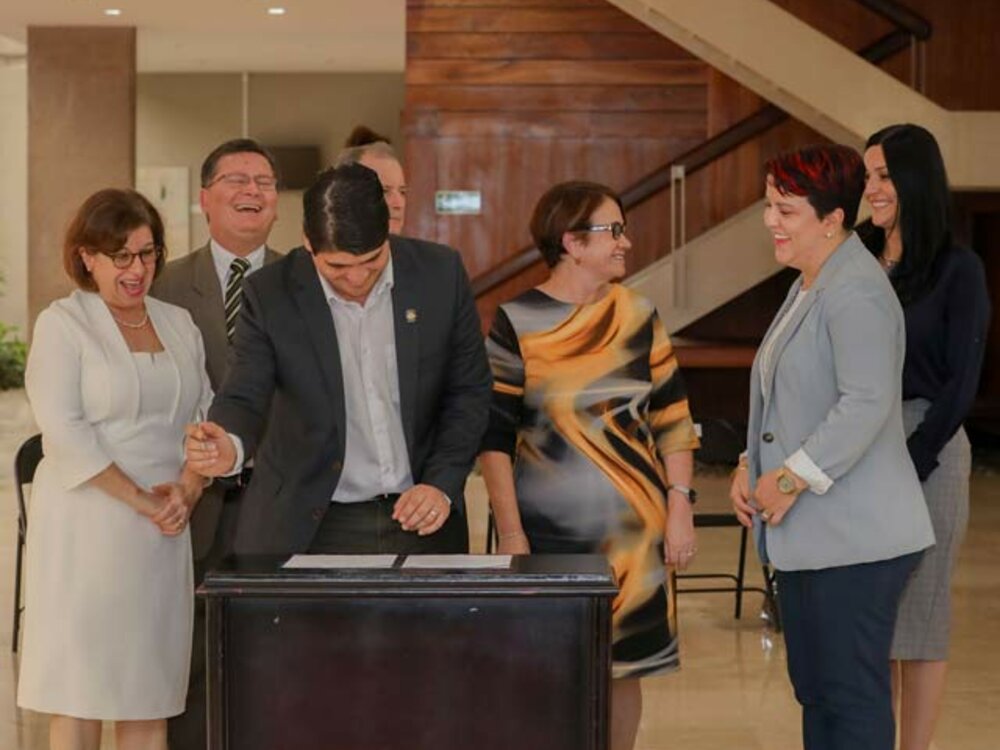New infrastructure amounting to US$55.08 million will boost the economy of Limón

President signs loan law with CABEI for sanitation works at AyA and flood control works at SENARA for a total amount of US$55.08 million.
San José, Costa Rica, June 13, 2019.- This Friday, President Carlos Alvarado signed Law 9690 approving a US$55.0 million loan for two important infrastructure works in the city of Limón; one involves a wastewater sanitation project under the responsibility of the Costa Rican Institute of Aqueducts and Sewers (AyA), and the other a flood control project to be executed by the National Service of Groundwater Irrigation and Drainage (SENARA). Both projects will be financed by the Central American Bank for Economic Integration (BCIE) through the Ministry of Finance.
During the loan signing ceremony, Mr. Alvarado stated that, "The Government and the province are grateful for the priority that the congressmen and women gave to this loan, completing the legislative process in just 6 months. The investment will turn Limón into the city with the largest sanitary sewer coverage in Costa Rica, allowing flood control and improving some of its most impoverished towns at a landscape level."
Participants at the event included the Minister of Finance, Rocío Aguilar; AyA Executive President, Yamileth Astorga Espeleta; SENARA General Manager, Patricia Quirós Quirós; CABEI Director for Costa Rica, Ottón Solís; and congressmen and women of the province of Limón.
The "Limon Sewage and Flood Control Program" represents a total investment of US$55.08 million and will benefit more than 43,800 residents of Limón, improve public health conditions and positively impact on the tourism activity in the area. The construction and operation of the works will lead to the creation of 250 temporary jobs and 25 permanent jobs.
CABEI Director for Costa Rica, Ottón Solís, commented that, "the Program target areas are cataloged in the maps as regions of extreme poverty, reason why this loan contributes with the balanced economic development of zones in the country that require urgent and special attention. This type of intervention has a high priority within the CABEI strategy to improve the quality of life of the Central American region."

The two works are contemplated in the 2019-2022 National Development and Public Investment Plan and will begin execution between 2020 and 2021. Below are the details:
Expansion of the sanitary sewer system (AYA)
The project "Improvement and expansion of the sanitary sewage system of the city of Limón," which is the responsibility of AyA, will currently benefit 30,000 people and up to 43,000 by 2045, mainly in the western neighborhoods of the city, including Limoncito, Envaco, Pueblo Nuevo and Los Baños.
The project will increase the quality of life of the local population, provide greater security to tourists regarding the quality of water on beaches and seas, allow greater control of diseases and increase the added value of areas with sewerage.
The works represent an investment of US$42,275,000, of which US$42 million will be provided from the CABEI loan and the remaining from AyA. The project involves the construction of 76 kilometers of piping and 24 pumping stations, as well as improvements to the submarine outfall station.
Flood Control System (SENARA)
The project "Channeling and flood control of the Limoncito river," which is the responsibility of SENARA, will optimize the conditions of this river by expanding its channel by more than 7 kilometers, benefitting 23,730 people in the Limoncito sector located south of the city.
The US$14.3 million budget will be financed with CABEI funds amounting to US$13 million and with US$1.2 million from SENARA's own resources.



